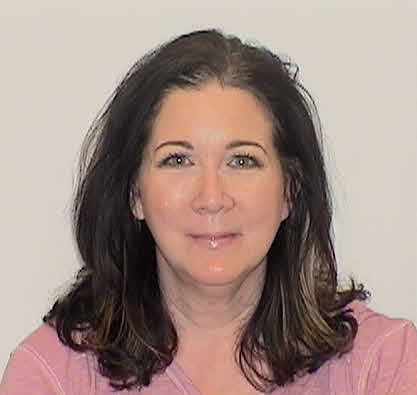Dr. Rebecca Bokoch
Associate Professor in the clinical psychology PsyD program, Los Angeles campus
Q: Can you tell us about the program and the students in your classes?
A: We get a mix of students coming straight from undergrad and some who got a master’s degree, and we have some people who are having a second career or have been out of school, working in the field for a while and they're feeling a little rusty on research. I want to help everyone get to the same place so I really emphasize that they should tell me what they’re interested in researching and I will try to implement that into the course.
One of the posters here is a result of the research practicum course series that I teach which is like a mini dissertation course. It’s a three-semester course series where they do a mini dissertation project, and they get to pick what research ideas they want to pursue and then I help them to design a study. In the first semester, they write their literature review and design the study and in the second semester we apply to IRB get approval and they start collecting their data. And then in the third semester they write up their results and discussion.
Q: Can you talk about the support you provide students on their dissertations?
A: Students come in with certain ideas and we try to help them build their interest area from the start. I ask them what they are interested in researching and I incorporate that into some of our examples for exams. When we learn a statistical analysis, I have them write up a research question where they would use that statistical analysis to answer the question so they're really starting to think about their research and how they can turn that into a project from the start.
And then the research practicum course is like holding their hand through a mini dissertation project which can lead to presentations and publications and then they feel more prepared once they go into their dissertation. What's nice about the research practicum is they can work out the kinks and learn from this first project. It’s a really great way for them to learn about what worked and what which can help them to think about what they want to do next in their dissertation.
Q: Any advice for students coming into the program?
A: I always tell my students to really work on building their relationships and maintaining good relationships with each other as peers and with their faculty. As an undergraduate, I was at a large institution, and I was in classes with hundreds of students, so I never got to have that kind of mentorship.
I'm an alumna of Alliant as well and going through that program I got to have much smaller class sizes and really build relationships with instructors that had similar research and clinical interests with me. I do a lot of research personally on children and families and mindfulness and art therapy techniques and I really was mentored by another faculty that had that interest area and helped me to build up my clinical experience in that area and conduct research in that area as an R.A.
Beyond just the courses they take students can build relationships with professors working as teaching assistants, research assistants, and taking classes from them.
We also pair them with mentors in the first year and when they take their research practicum, they may start to get to know a certain professor better with their research and then of course they get to have a chair match with them for dissertation. And I think it's nice that they don't have to pick which faculty they're going to work with for dissertation from day one because it allows them to have a chance to really get to know the professors and who would be a good fit for them with regard to research interests and mentorship styles. We give students time to figure out who's going to be the best fit.

